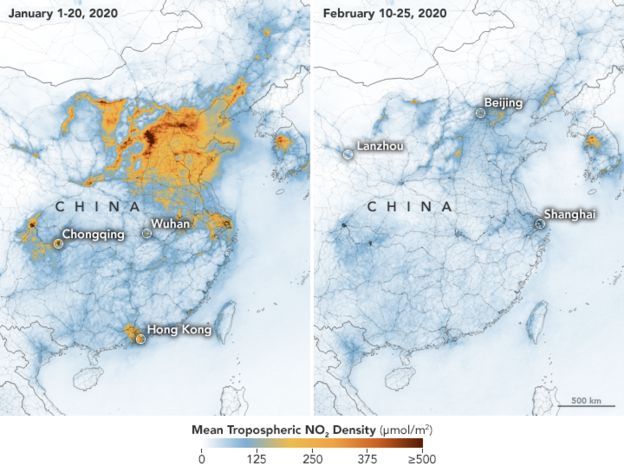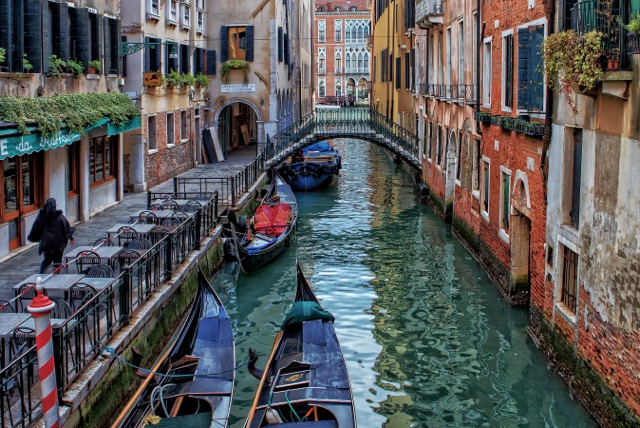In the past few weeks we have seen the world change. I bet, if you had told us all at the very start of the year, what we were to experience in just a few short months, we would not have believed it. As Covid-19 works its way across the globe, many of us have been left scared, isolated, and unsure of what to do.
It has been so uplifting to see the wonderful acts of kindness, community, and solidarity being shared across social media channels. Personal trainers leading balcony workouts for people quarantined in Spain, applause and acknowledgement for the healthcare staff on the frontline in Italy, and adorable act of support in England as a playground of school kids serenaded the inhabitants of a care home across the street.
One of the pieces of good news that people have been clinging on to in these scary times is the incredible impact the reduction of travel and activity has already had on the environment. Carbon monoxide produced by cars is down by 50% in New York and, in China, carbon dioxide emissions are down by 25%.
These images from NASA showing the drop in Nitrogen Dioxide levels in China have been circulating widely, as have the images across social media of crystal clear water in the canals of Italy.

It is undeniably inspiring to see just how quickly our planet can bounce back when given a break from incessant human activity. But here is why we shouldn’t be celebrating the clear canals in Venice just yet.
Greenhouse gases are likely to spike after the crisis
Climate change experts and scientists warn us that the way governments choose to re-stimulate economies in the wake of the pandemic will have a huge influence on climate change.
Fatih Birol, executive director of the International Energy Agency (IEA) said: ‘There is nothing to celebrate in a likely decline in emission driven by economic crisis because, in the absence of the right policies and structural measures, this decline will not be sustainable’
It has been quoted that after the global financial crash in 2008-09, ‘carbon emissions shot up by 5% as a result of stimulus spending that boosted fossil fuel use.’
There are also fears that any momentum built by climate protesters in recent months will be lost, as climate change policies will be put on the back burner as governments address this new crisis. This is amid comments from the foreign secretary Dominic Raab that there is ‘no cast iron guarantee’ that the COP26 climate change conference due to take place in Glasgow in November will go ahead.
A chance to change the world
Campaigners urge governments to be mindful in their decision making in the coming months. One suggestion is that any airline bailout packages should be accompanied by far stricter regulations on the reduction of aviation emissions.
The IEA also recommend that governments take this opportunity to ‘phase out or scrap fossil fuels subsidies, which could be used to boost healthcare spending’.
Birol reminds us we live in a different world now than in the past when we have struggled to recover from other crises. Now we have ‘cheaper renewable technologies, have made major progress in electric vehicles, and there is a supportive financial community for the clean energy transition’.
A test of our priorities
This pandemic has been catastrophic in so many ways. Hundreds of thousands of people have lost loved ones, jobs, financial security, and businesses that they have spent years working to build which now face a very uncertain future.
It is very hard to find silver linings amongst all this chaos. The crystal clear canals in Venice, a city on the brink of environmental ruin due to mass-tourism, is a shining beacon of hope in the darkness.
For years we have been on a collision course headed straight to environmental breakdown and this is our chance to turn the ship around. This tragic, terrible, scary thing has forced us to stop all activity and take a break from the constant production and productivity of our modern world. Let’s use this forced hiatus to look around and take stock of our lives.
Do we really need to be travelling in such an incessant and unsustainable way? Can our newfound expertise for videoconferencing tools improve our work/life balance? Can we continue to connect with and support our local communities even when the crisis is over?
What will the future look like?
How governments across the world react to this pandemic will be a real test of their priorities. We have an unprecedented opportunity for system change on a global level. I urge everyone, policymakers, governments, business owners, and the public alike; lets not allow our fear to make us short-sighted. As we pull together to make it through the coming months and look to rebuild in the future, we must try to take a long-term view.
Birol tells us: ‘if the right policies are put in place, there are opportunities to make the best of this situation’.
So, as we emerge from this pandemic, and we start to heal and rebuild: what kind of a word to we want to create?
If you are in need of some entertainment while stuck at home, check out my book reviews for some recommendations:
January Book Review: What I’ve read in 2020 so far
The Secret Commonwealth, Philip Pullman – Review
Book Review – Eating Animals, Jonathan Safran Foer
